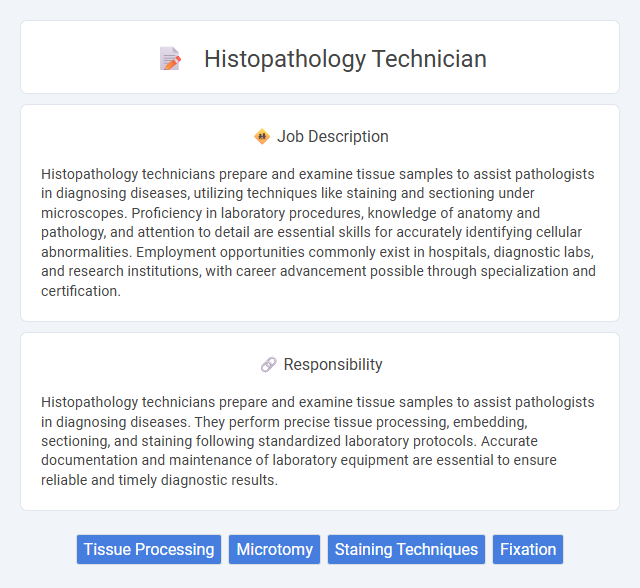
Histopathology technicians prepare and examine tissue samples to assist pathologists in diagnosing diseases, utilizing techniques like staining and sectioning under microscopes. Proficiency in laboratory procedures, knowledge of anatomy and pathology, and attention to detail are essential skills for accurately identifying cellular abnormalities. Employment opportunities commonly exist in hospitals, diagnostic labs, and research institutions, with career advancement possible through specialization and certification.
Individuals with strong attention to detail and a steady hand are likely to be well-suited for a job as a histopathology technician, as the role involves preparing tissue samples for microscopic examination. Those who prefer working in a laboratory setting and have an interest in biology and medical science may find this career satisfying and engaging. However, people who are uncomfortable with handling biological specimens or working in environments requiring strict adherence to safety protocols might find this profession challenging or unsuitable.
Qualification
Histopathology technician roles require a diploma or degree in histotechnology or medical laboratory technology, with specialized training in tissue processing and staining techniques. Certification from recognized bodies such as the American Society for Clinical Pathology (ASCP) enhances job prospects and validates expertise in microscopic slide preparation and analysis. Strong knowledge of laboratory safety protocols, anatomy, and pathology is essential for accurate diagnosis support in clinical settings.
Responsibility
Histopathology technicians prepare and examine tissue samples to assist pathologists in diagnosing diseases. They perform precise tissue processing, embedding, sectioning, and staining following standardized laboratory protocols. Accurate documentation and maintenance of laboratory equipment are essential to ensure reliable and timely diagnostic results.
Benefit
A Histopathology technician likely experiences benefits such as gaining hands-on expertise in tissue sample analysis and contributing to accurate disease diagnosis. The role may provide opportunities for continuous learning and skill enhancement in medical laboratory technology. Job stability and potential for career advancement in clinical pathology fields could also be significant advantages.
Challenge
Histopathology technicians likely face challenges in accurately preparing and examining tissue samples, where precision is crucial to avoid diagnostic errors. Complex staining techniques and maintaining strict laboratory protocols may demand continuous learning and adaptability. High workloads and time-sensitive cases could also increase the probability of work-related stress and fatigue.
Career Advancement
Histopathology technicians play a critical role in diagnosing diseases by preparing and examining tissue samples under a microscope. Career advancement opportunities include pursuing specialized certifications, gaining expertise in molecular diagnostics, or advancing to supervisory or laboratory management roles. Continuous education and proficiency in the latest histological techniques and laboratory technologies significantly enhance career growth and salary prospects.
Key Terms
Tissue Processing
A Histopathology technician specializes in tissue processing to prepare biological samples for microscopic examination, ensuring accurate diagnosis of diseases. Proficient in techniques such as fixation, dehydration, embedding, sectioning, and staining, they maintain precise protocols to preserve tissue morphology and cellular details. Skilled use of microtomes and automated tissue processors enhances efficiency and accuracy in producing high-quality histological slides.
Microtomy
A Histopathology technician specializes in preparing tissue samples for microscopic examination by performing microtomy, a precise technique involving the cutting of thin tissue sections using a microtome. Proficiency in embedding and sectioning ensures the production of uniform, high-quality slices critical for accurate pathological diagnosis. Expertise in handling delicate specimens and maintaining microtome equipment is essential to support efficient laboratory workflows and diagnostic accuracy.
Staining Techniques
Histopathology technicians specialize in staining techniques crucial for microscopic examination of tissue samples, including Hematoxylin and Eosin (H&E), immunohistochemistry, and special stains like PAS or Masson's trichrome. Precision in applying these stains ensures accurate differentiation of cellular components, aiding pathologists in diagnosing diseases such as cancer and infections. Mastery of automated and manual staining procedures enhances diagnostic efficiency and reliability in clinical laboratories.
Fixation
Histopathology technicians play a critical role in tissue fixation, using chemical agents like formalin to preserve biological samples and prevent degradation. Proper fixation maintains cellular architecture and protein integrity, enabling accurate microscopic examination and diagnosis. Expertise in fixation protocols ensures consistent sample quality, directly impacting histopathological analysis and patient outcomes.
 kuljobs.com
kuljobs.com